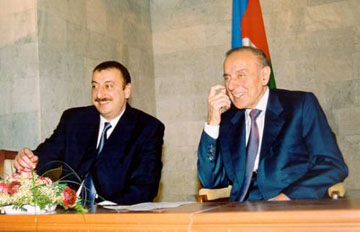How Azerbaijan Is Like ‘The Godfather’
- (0)

How Azerbaijan Is Like ‘The Godfather’ – One family controls nearly every major part of the Caucasian nation –
by Michael Weiss
Few developments speak so well of how far Caucasian dictatorships have come since the grey days of the Soviet Union as the fabulously wealthy and incredibly investment-savvy 15-year-old male heir of Azerbaijan’s ruling family.
When he was a mere 11 years old, Heydar Aliyev, the son of Azerbaijan’s President Ilham Aliyev, purchased $44 million in luxury mansions on Palm Jumeirah, the elite artificial archipelago built by Dubai and known for housing both holidaying British soccer players and thieving Russian tax officials. $44 million is, in the words of the Washington Post’s Andrew Higgins, who broke the story in 2010, “roughly 10,000 years worth of salary for the average citizen of Azerbaijan.” But young Heydar wasn’t the only member of his family engaged in Gulf property speculation. His two older sisters, Leyla and Arzu, were also listed as owners in Dubai’s Land Department registry. Together, the three Aliyev children invested in $75 million in Dubai real estate, which certainly is impressive considering that their father’s official annual income as a public servant is just $228,000. When asked for comment by Higgins, who showed how the date of birth and name for the listed Dubai owner was the same as Ilham’s dauphin, Aliyev’s spokesman Azer Gasimov replied: “I have no comment on anything. I am stopping this talk. Goodbye.”
The reader will therefore understand why I didn’t bother to try to reach Gasimov to explain Heydar’s other high-profile but low-recognition investment. Now 15, the Aliyev son and likely heir to Azerbaijan’s political dynasty has also got himself a sideline in commercial banking, judging from corporate filings I’ve obtained. These documents show that he controls a parent company that owns, through an offshore subsidiary, almost half of Russian mega-bank VTB’s Azerbaijani subsidiary.
Nothing wrong with that, you say. It’s a fine idea to give a pubescent a solid education in the credit industry, what with all global shenanigans that have taken place in the last five years.
There are only two problems.
The first is that VTB, which is the second-largest bank in Russia and is 75 percent-owned by the Russian government, is also one of the fastest-growing financial institutions on the planet, with retail, commercial and investment arms in 19 countries, including the United States. It has been, and continues to be, dogged by civil lawsuits filed in multiple jurisdictions because of its issuance of loans that have led High Court justices to wonder “what, if any, due diligence” was carried out beforehand. VTB has been accused to being little more than a vehicle for the enrichment of its executives and for the Kremlin’s “economic diplomacy” in luring foreign direct investment to Russia–a Putinist Lehman Brothers. In 2011, it took in about $712 million in German and French pensioner deposits, and earlier this year, it featured prominently and unflatteringly in the Cyprus credit implosion,given the $13.8 billion in assets it had tied up in the Mediterranean country long rumored to be a money-laundering haven.
Embattled Russian opposition leader Alexey Navalny is particularly fond of exposing VTB’s dodgy history; in September 2012, his Foundation for Fighting Corruption published a comprehensive report examining some of the highlights (full disclosure: I edited it).
The second problem is that in May of this year, Azerbaijan’s sovereign wealth fund invested $500 million in VTB’s secondary public offering (SPO). It was joined by Qatar’s and Norway’s sovereign wealth funds and, collectively, all three gobbled up 55 percent of the SPO. According to Herbert Moos, VTB’s chief financial officer, “We have been working with the [Azerbaijani sovereign wealth fund] on a real estate investment in Moscow, their first investment, and they have a 20 percent allocation to Russia so they made a strategic decision to invest in us and become a business partner.”
Good thing Heydar has ample real estate experience, otherwise his father’s regime might have balked at the prospect of throwing a cool half a billion into a bank heavily owned by the baby of the Aliyev family.
Here’s what we can prove from open-source financial filings and Panama’s surprisingly helpful corporate registry. On November 9, 2009, Ataholding, an open joint-stock company that manages AtaBank, one of the biggest commercial banks in Azerbaijan, purchased 48.99 percent of VTB’s Azerbaijani subsidiary. The remaining 51 percent is owned by VTB and thus mostly owned by the Russian government. As of December 31, 2009, AtaBank’s investment was valued at 10,887,310 Azerbaijani manats, which at today’s exchange rate is around $13.8 million.
Ataholding is 51 percent-owned by a Panama-registered shell company called Hughson Management, Inc., of which, as the Ataholding financial statement for 2009 informs us, Heydar Aliyev has the controlling interest. At least that’s in the iteration of the statement I received. (Here’s a PDF copy and mark that the metadata dates its drafting in 2010.)
Curiously, and perhaps owing to the diligent spadework of Andrew Higgins, the Ataholding statement currently hosted on the company’s website does not include the notes section of the earlier copy, which features this disclosure:
The Group’s immediate parent is Hughson Management Inc, tax resident of Republic of Panama (2008: Hughson Management Inc, tax resident of Republic of Panama). The Group is ultimately controlled by Mr. Heidar Aliyev (2008: Mr. Heidar Aliyev).
Hughson Management is still currently listed as the majority owner of AtaBank.
Now, there have been exactly two prominent Heydar Aliyevs in Azerbaijan’s recent history. The first was a KGB chief turned Communist ruler of the Soviet autonomous region (1969-1982) and was the kind of Stalinoid satrap-cum-mafia kingpin who found it necessary to bribe Leonid Brezhnev in order to remain in power. Gorbachev’s rise in Moscow coincided with this Heydar’s eclipse in Baku. He subsequently became first the de facto head of the republic, as the USSR was falling apart, and then the first president of post-Soviet Azerbaijan in 1993. Heydar ruled until 2003, which is the year he died. That would have made it difficult — though probably not impossible given that Azerbaijan one of the world’s most corrupt countries — for him to be found owning banks five years later. The elder Heydar was immediately succeeded by his son Ilham, the State Department’s Michael/Sonny metaphor whose own “election” in 2003 Human Rights Watch characterized as the rotten fruit of “bureaucratic interference and political intimidation against the opposition [which made] a free and fair pre-election campaign environment impossible.” Terms limits for presidents were abolished in 2009, the same year the regime clamped down on domestic press freedoms and took the BBC, Radio Free Europe/Radio Liberty, and Voice of America off the air.
Here’s how the U.S. embassy in Baku described Ilham Aliyev in 2009:
“Azerbaijan’s President Ilham Aliyev utilizes distinctly different approaches to foreign and domestic policies. He typically devises the former with pragmatism, restraint and a helpful bias toward integration with the West, yet at home his policies have become increasingly authoritarian and hostile to diversity of political views. This divergence of approaches, combined with his father’s continuing omnipresence, has led some observers to compare the Aliyevs with the fictional ‘Corleones’ of Godfather fame, with the current president described alternately as a mix of ‘Michael’ and ‘Sonny.’ Either way, this Michael/Sonny dichotomy complicates our approach to Baku and has the unfortunate effect of framing what should be a strategically valuable relationship as a choice between U.S. interests and U.S. values.”
***
What else do we know about Hughson Management, the parent company of Ataholding? Well, the president and treasurer of it are, respectively, little Heydar’s older sisters, Arzu (now aged 24) and Leyla (who just turned 28 last week). Here’s a nice shot of the entire Aliyev brood looking very happy and glamorous.
Arzu and Leyla were linked to a highly lucrative Azerbaijani telecom company called Azerfon in a much-discussed piece of investigative journalism conducted by Khadija Ismayilova of RFE/RL in June 2011. Ismayilova found that Azerfon was owned by three Panama-registered entities, another company registered in a Caribbean tax haven jurisdiction, and Azerbaijan’s state-owned Aztelekom company. The three Panama-registered companies each owned a 24 percent stake: one of these was Hughson Management. And although Ismayilova cited the governance structure of Hughson in her article, she did not disclose that the owner was Heydar Aliyev, which adds telecom mogul to his real estate and banking portfolio. (Just wait till he gets to college.)
She did, however, connect Hughson to a mysterious third party, a Swiss financier and art collector named Olivier Mestelan, who owns the Kicik QalArt gallery in Baku and founded the Art ex East Foundation. He was profiled prominently in the Moscow-published “style magazine” Baku, the editor-in-chief of which is none other than Leyla Aliyeva, who is very style-conscious indeed. The Mestelan profile stated that the Swiss national owns property in Azerbaijan and visits the country several times a year. But he evidently does a bit more than that. In August 2011, this State Department cable named Mestelan as one of the “top Azerbaijani officials…of particular interest” to the U.S. government owing to these officials’ cozy relationships with Baku’s first family, chiefly President Ilham and his wife Mehirban Aliyeva.
These are not relationships that Aliyevs wish to see explored by muckraking journalists. Following her exclusive, Ismayilova was targeted by a particularly nasty campaign of state harassment, which included her being sent an envelope filled with “pictures of a personal nature” and a message reading: “whore, behave, or you will be defamed.” These images were later published in Azerbaijani newspapers associated with the ruling New Azerbaijan Party, of which President Aliyev is also the chairman. Ismayilova later discovered and documented surveillance wires that had been installed in the walls and ceilings of her home kitchen, bathroom and bedroom, apparently while she was out of the country just days after RFE/RL published her piece. The government’s “investigation” of the tapping of Ismayilova’s residence was a whitewash.
Of further interest is the fact that, according to Hughson’s more recent governance filings, Olivier Mestelan left the company as secretary in April 2012, about a month before second RFE/RL report — this one co-written by Ismayilova — demonstrated how the Aliyev regime had assigned the Azerbaijani International Mineral Resources Operating Company, Ltd (AIMROC) the right to develop a gold mine valued at $2.5 billion in Chovdar, a mountainous village in the Nagorno-Karabakh region of Azerbaijan, which was ravaged by years of war with Armenia. AIMROC, widely thought by angry Chovdar residents to be a British company, is in fact owned by four separate shells, only one of which (Globex International) is British. RFE/RL found that Globex International was itself owned by three Panama-registered companies, each of which listed Leyla and Arzu Aliyeva and Olivier Mestelan as senior managers. As of this writing, Mestelan is also listed as a member of the ” supervisory board” of Ataholding, the company that owns AtaBank and half of VTB’s Azerbaijani subsidiary.
I’ll do the State Department a favor and cast Mestelan as the “Tom Hayden” of the Aliyev family.
THE ATLANTIC


















